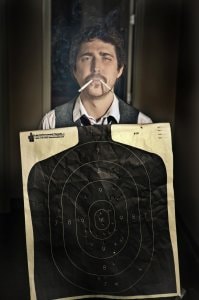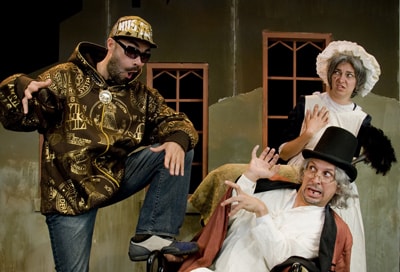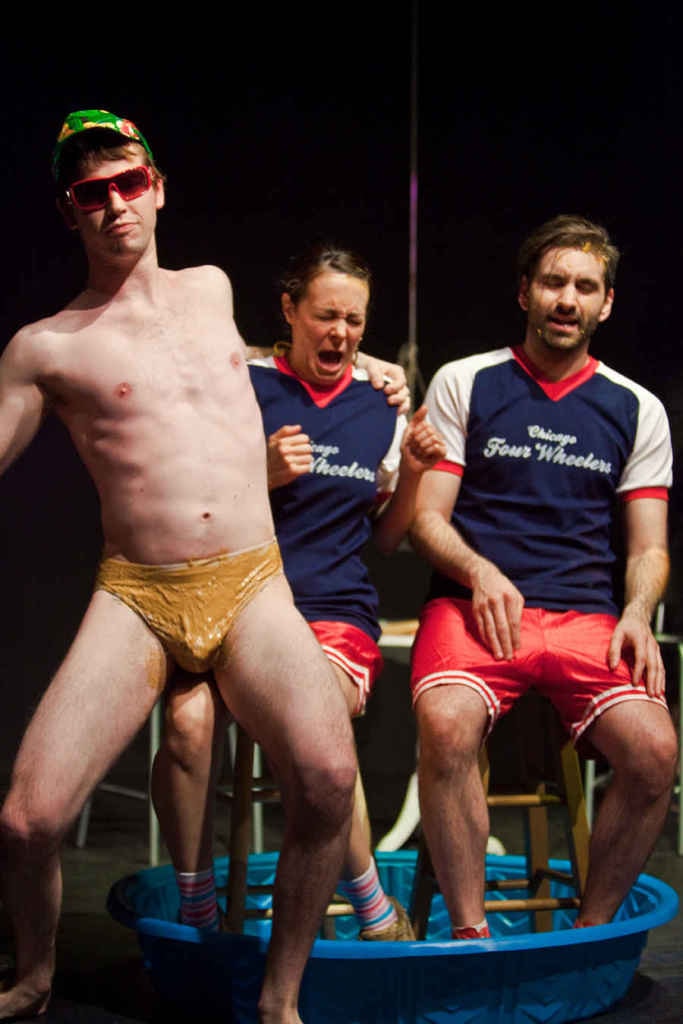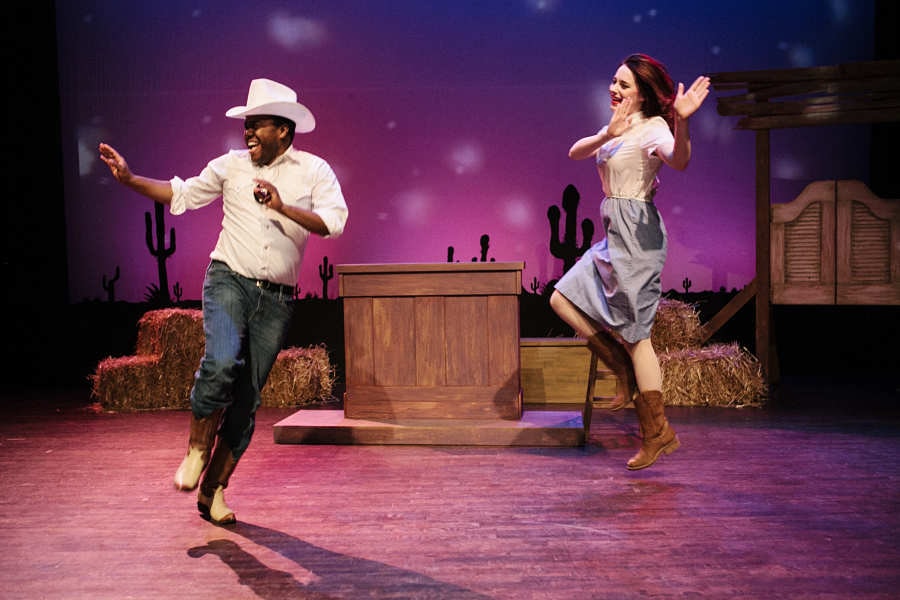ATLANTA: Around the corner from several bars, clubs and taquerias in Hotlanta’s vibrant Little Five Points neighborhood, comedy mainstay Dad’s Garage Theatre Company offers a mix of scripted and improv shows out of 7 Stages‘ Euclid Avenue storefront. They’ve also been known to pop up elsewhere around town (next up: a holiday gig at the town’s LORT powerhouse the Alliance; more on that below). The company’s artistic director is Kevin Gillese, one of a seemingly endless supply of Canadians nonviolently occupying American comedy stages. We spoke to Gillese about the serious work behind his troupe’s cheerfully disreputable fare.
Who founded Dad’s Garage, when, and why?
Dad’s Garage was founded in 1995 by a bunch of recent Florida State University grads; some of our founders still improvise with us today (George Faughnan, Matt Stanton, Chris Blair). They had a college improv group called the Whammo Players and were looking for a place to do their thing. They found a spot in Atlanta and were like, “Okay, here we go, we’re moving to ATL.” They wanted to create a space where theatre could be fun and accessible, somewhere that they could make shows that spoke to their (admittedly sophomoric) sensibilities.

Tell us about yourself and your connection to your theatre.
Dad’s Garage has a sister company way up north in Canada called Rapid Fire Theatre; that’s where I got my start. My first international performance was in 2000 when RFT sent me down South to perform in Dad’s Garage’s World Domination Theatresports Tournament. I came back many times. Eventually I became the artistic director of Rapid Fire. Then, when Dad’s Garage was looking for a new a.d., I threw my hat in the ring. I’ve now been here almost five years and I’m loving it. The only thing I miss is poutine and free healthcare.
I should mention that in addition to being the artistic director, I’m also an ensemble member, which means I perform in improv shows, teach classes, act, write, direct and am basically in the trenches with all of my performers every weekend.
What sets your theatre apart from others in your region?
We do strictly comedy, which I don’t think anyone else does. We do original scripted shows as well as improvised shows, which is also uncommon, but the thing that gets me most excited is when we blur the lines between the two. A good example of this kind of hybrid project is our perennial classic, Invasion: Christmas Carol, where we mess with a traditional story by changing it every night.
We also throw big events like Baconfest, which isn’t really theatre in any traditional sense, but we see it as another way to interact with our audiences. We also do videos, celebrity events and hard-to-classify events like a neighborhood scavenger hunt. We’re pretty much a cauldron of “I wonder if this’ll work” mixed with “let’s try it anyway” and a sprinkling of “what the eff was that?” So I guess I’d argue that, for better or for worse, we’re not just unique in our region, we’re pretty different from most other theatre companies.

Who is your audience?
Most of our audiences are younger (20–40) and don’t really consider themselves patrons of the arts. We like to think of ourselves as the gateway drug to the arts. Many of our audience members have never seen a live theatre show before, so we try to break them in nice and gentle with some outrageous comedy. There are huge upsides and downsides to attracting people in this way; while we may be engaging a hugely sought-after demographic, we also have to boot out groups of drunk yahoos from time to time.
Tell us about your favorite theatre institution other than your own, and why you admire it.
Theatre Network in Edmonton is a company that I love. They support young artists like crazy (NextFest is an incredible example of this), they produce/present exciting work across a variety of styles and are doing a fantastic job of keeping live theatre hip and attractive to young folks. In Atlanta, I love 7 Stages because I think they do intellectually challenging and aesthetically breathtaking stuff.
How do you pick the plays you put on your stage?
Our season planning process is very collaborative, inclusive and democratic. We basically gather everyone up in a room (artists, production folks, staff, etc.) and the artists take turns pitching shows. Normally the pitches are for new works that would be created for next season, but we also sometimes do existing work that speaks to our aesthetic (last season we did Sex AKA Wieners and Boobs by Joe Lo Truglio, David Wain and Michael Showalter). Then we all vote. Then I tabulate the votes along with my artistic staff. Then I look at the top-rated projects and try to piece together a season that has variety and shape. Then I take a proposed season to my managing director, marketing director and technical director. They number-crunch to see how much money the shows will cost to produce and how much we think they can make in ticket sales. If the numbers add up, we can announce the season; if they don’t, I try swapping in some other projects from our season planning tallies until we’ve got something that’s balanced.
What’s your annual budget, and how many artists do you employ each season?
Our annual budget is about a million bucks, our ensemble is 21 people at the moment. There are plenty of other artists that we work with (designers, junior improvisers, contracted artists for one-off projects, guest instructors), but the ensemble is the most consistently employed group of artists. If you were to include every artist that we pay a dollar to over the course of a season, that number would probably be more like 40 or 50.
What show are you working on now? Anything else in your season that you’re especially looking forward to?
At the moment I’m about to go into rehearsals for It’s A Wonderful Laugh, which is being presented at the Alliance Theatre—a big “ooh la la” moment for us. It’s another one of our improv-scripted hybrid shows. I’ve been putting a lot of time into adapting the script, but it’s going to have such heavily improvised elements that most of my work will end up being the backbone rather than exactly what happens. I’m also directing it, so there’s really nobody keeping me in check, which is why I’m currently mad with power.
I’m also writing/directing a show with my longtime artistic partner Arlen Konopaki in the new year, called Battle Space Wars. It opens at the beginning of February. I’m super-stoked for it. Arlen and I have a two-man improv show called Scratch that we used to tour like crazy, but these days the only performing we do is an annual run at the Edmonton International Fringe Theatre Festival. The reason I bring it up is because that’s a big part of our process when writing a new show. We’ll riff on a theme throughout our run and write down all of our favorite moments and characters. These then become the ingredients for the script that we then hammer out long-distance.

Strangest or funniest thing you’ve ever seen (or put) on your stage?
You have to bear in mind that we regularly do things that would make a sailor blush. So these might sound extreme, but you have to remember the context. Okay, so…. One time we did a show where a character was furious with his plastic surgeon because he went under the knife for a nose job and woke up with a full set of cock and balls on his forehead. We had this perfect flaccid, full-sized, rubbery penis and testicles hanging off one of our performer’s faces, but the funny part was just how sad and defeated he was about the whole thing, and how he “accidentally” would constantly make penis puns and then get real embarrassed.
In another show we strapped raw squids to our performers’ heads and made them continue doing the show (because they were being “punished” for not entertaining the audience well enough), which was gross but fine…until ink started streaming out of their squid crowns and down their faces. Utterly terrifying and hilarious.
Finally: I once saw one of our performers get a lap dance onstage from a werewolf who was completely covered in peanut butter, but that’s not the crazy part. Afterwards the recipient said he wasn’t feeling great; I asked him why and he said that he had an allergy to peanuts. I asked him why in the name of God he didn’t mention that earlier—we’d been planning this bit for a few days—and he said he thought it sounded funny and that he could just tough it out. I couldn’t have face-palmed harder.
What are you doing when you’re not doing theatre?
I like to travel (favorite cities include Prague, Vancouver, New Orleans and Berlin). I also love reading crisp modern fiction. Rapping is super-fun for me and I’ve done a bunch of side projects in hip-hop just for shits and giggles. Also, of course, spending time with my wife and my dog.
What does theatre—not just your theatre, but the American or world theatre—look like in, say, 20 years?
I think that other forms of media will be integrated into all of our operations, and not just in a “oh look, we used a projector” or “we made a video of the talkback and posted it on our YouTube page” way. I mean that theatres will start functioning more like incubation tanks for projects that will eventually become films or videos or TV shows or whatever. Those other forms of media have the ability to make larger amounts of money, and money is what our industry desperately needs right now.
Like animals drawn to sources of fresh water in the wild, I believe our industry will follow the money in order to survive. Content creation is such a buzz term these days, and aren’t theatre practitioners the original content creators? I think it’s inevitable that theatre will merge with new media to some degree.


